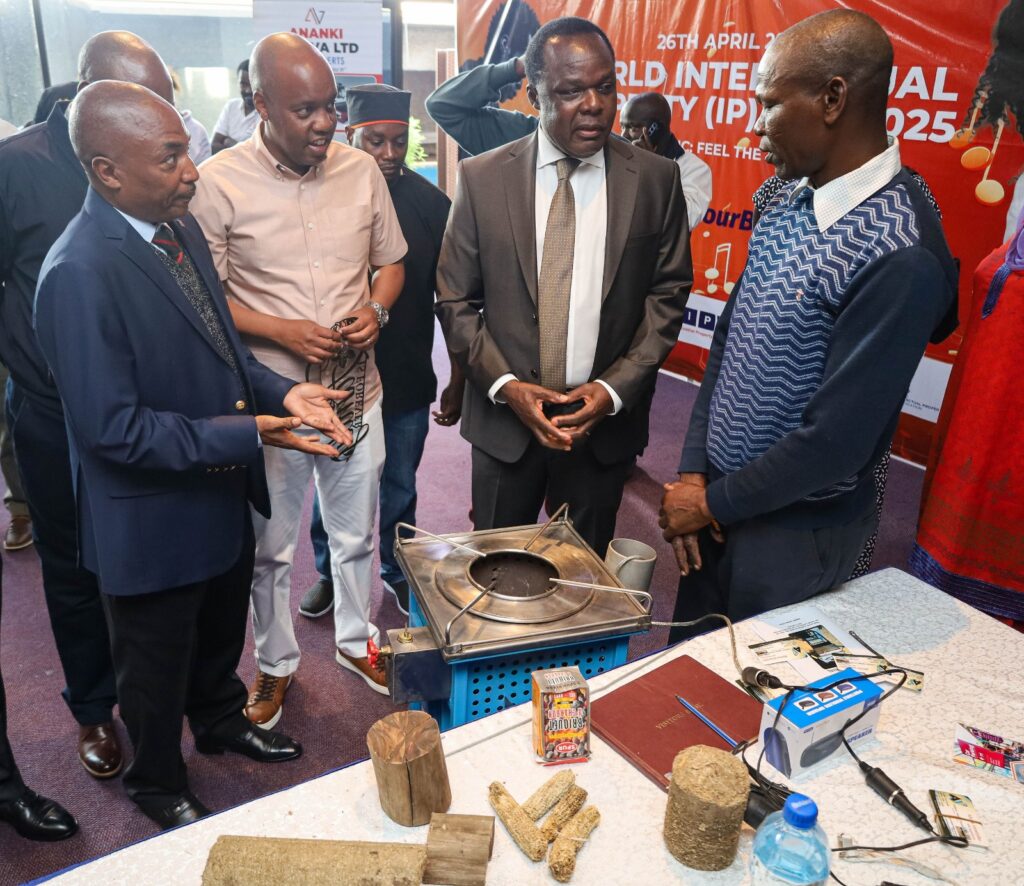Ministry of Industrialisation Urges Creatives to commercialize ideas for economic gain

Young innovators and artists have been urged to move beyond merely creating and protecting their work to fully commercializing their ideas as a way of securing economic empowerment, national pride, and global recognition.
Speaking during the celebration of World Intellectual Property Day 2025 KICC, Dr. Juma Mukhwana, the Principal Secretary for the State Department of Industry, emphasized that while protection of intellectual property was important, commercialization was the ultimate mark of success.
He challenged creatives to focus on producing marketable innovations, insisting that success is measured not by the number of exhibitions attended but by the number of products, songs, or ideas sold.
“If you are not selling your innovation, it is a useless innovation. If you are not selling your music, it is of no use, it isn’t music. So, discovering an idea and walking around from one exhibition to another without selling is a waste of time,” said the PS adding that creatives may spend a lot of time producing things that don’t see the light of day and that the measure of success of any design, idea, product or song is their commercial value.
Mukhwana highlighted a troubling gap in Kenya’s innovation sector, noting that despite the high number of registered patents and trademarks, only less than 10 percent are commercialized. He warned that innovation without market presence risks becoming obsolete within a few years.
Encouraging the youth, he pointed out that Africa’s large and growing market presents an open opportunity for Kenyan creatives to reach beyond local the local market. He urged innovators to avoid hiding their talents, collaborate where necessary for marketing and sales, and to cultivate a culture of loving Kenyan innovations and products as a means of driving economic growth.
“Don’t think about the Kenyan market of 55 million customers; the government has opened a wider market in the African Continental Free Trade Area with about 1.4 billion people. If you make a product in Kenya, you can sell it to all the countries across East Africa, Tanzania, Uganda, Burundi, Rwanda, DRC, South Sudan, Somalia. You can sell it in the rest of Africa,” he stated.
The call to action was echoed by John Onyango, the Managing Director of the Kenya Industrial Property Institute (KIPI), who stressed on the immense economic potential within the creative sector, especially music.
Onyango acknowledged the celebration as a milestone for musicians and the broader creative industry, recognizing not only singers but also composers, producers, and recorders stood to benefit from patenting and trademarking their creations. He emphasized that intellectual property is a powerful tool for unlocking economic opportunities and driving national development.
Onyango observed a positive shift in Kenyan audiences increasingly embracing local music, a departure from previous decades when foreign music dominated local airwaves. He described music as a vital channel for communication, influencing behavior and societal attitudes. Beyond its cultural value, he stressed that music has a formidable economic value chain right from composers and songwriters to publishers, performers, and manufacturers that could substantially contribute to job creation, income generation, and the country’s Gross Domestic Product (GDP).
He urged musicians to treat their craft as a serious business rather than a pastime, noting that organizations such as the Kenya Copyright Board (KECOBO) and the Anti-Counterfeit Authority are working to protect their rights and ensure they earn rightful royalties.
“Look at music as a business, not just a pastime undertaking. This is a real business that can generate a lot of income,” said Onyango.
Onyango reaffirmed KIPI’s commitment to empowering young creatives, and called on the government to enhance its support for the sector to realize its full potential in boosting the country’s economy.
Similarly, Dr. Robi Mbugua, the Chief Executive Officer of the Anti-Counterfeit Authority, emphasized that creativity is deliberate labor, not mere chance. He further warned that piracy and counterfeiting of creative works are not only illegal but also violations against national dignity. He disclosed that over the past five years, enforcement efforts had resulted in the seizure of counterfeit music equipment valued at over Ksh 30 million.
Dr. Mbugua hailed the proposed merger of KIPI, ACA and KECOBO into the Kenya Industrial Property Authority which will handle registration, custody, and enforcement of intellectual property rights in Kenya, noting that it would enhance the fight against counterfeiting. He assured creatives that the government is taking steps to ensure their work is recognized, respected, and rewarded.
He said that creativity, must be protected not only by law but by society’s collective will, as music and other forms of art play critical roles in teaching, healing, inspiring, and unifying people.
Allan Kosgei, the KIPI Board Chairman highlighted ongoing efforts to digitize processes within the organization with support from the World Intellectual Property Organization (WIPO), noting that it’d enhance transparency and efficiency in service delivery. He emphasized that supporting innovators and creatives is integral to achieving Kenya’s Bottom-Up Economic Transformation Agenda.
Josphat Kabeabea, Chairman of the Anti-Counterfeit Authority, further rallied behind the creatives, noting that Kenya’s history is told through music, dance, poetry, and storytelling, which serve not only as cultural artifacts but also as political tools and economic assets. He challenged lawmakers to critically assess whether the current copyright laws and enforcement mechanisms adequately protect creators, urging stronger legislation and real budgetary support for the creative economy.
He further warned that neglecting creators would leave the nation without its stories, culture, or soul and urged Kenyans, as their civic duty, to protect their intellectual property.
The government, through its various agencies, pledged its continued support in ensuring that Kenya’s creative and innovation sectors thrive not just for national pride, but for real economic transformation.




